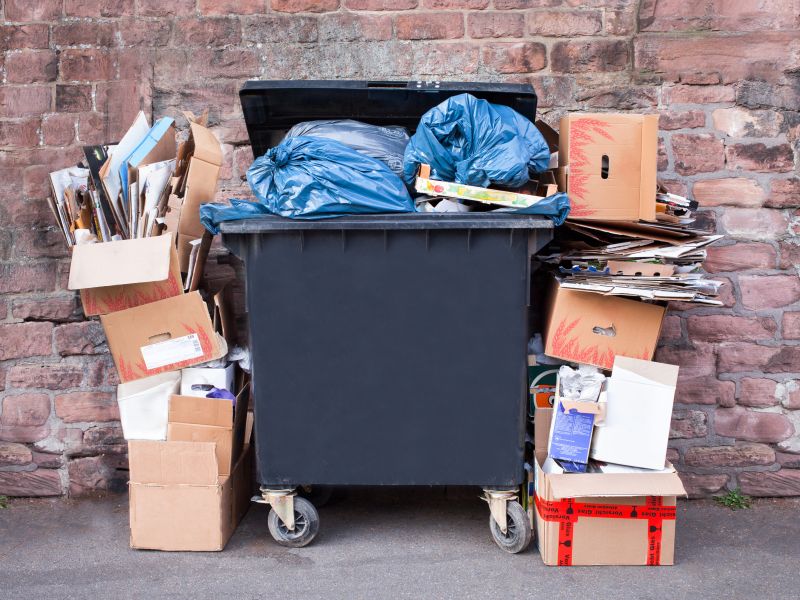
© eyetronic, Adobe Stock
Now, the Ministry of Education recommends schools add two new procedures: separate, and compost. Separating means removing and sorting glass, aluminium, suitable plastics and paper from general waste bins, while composting ensures organic material is not sent to landfill.
Read the latest print edition of School News HERE
For this to be effective, schools must have the appropriate bins available for separation. Recycling, general waste, and organic waste bins should be placed beside each other, and need to be clearly labelled.
Marty Hoffart from Zero Waste Education said a waste audit is a useful way to find out what waste a school is producing. Then, they can find ways to reduce it and measure how well their current recycling programmes are working.
“Having good systems in place at schools means better source separation and a lower environmental footprint. With climate change being our biggest environmental issue, students can take practical steps at school to do something positive for the environment.”
The results of the waste audit will indicate what types of materials are going to landfill. The practical steps for schools to reduce waste to landfill, Mr Hoffart said, usually come down to simple housekeeping. “The source of the materials can be identified and will usually be paper, cardboard, recyclable containers, or food waste. Most schools have access to commercial services to recycle or recover these materials and divert them to recycling or composting programmes.
“Some classrooms might not have a recycling bin, which means recyclable materials are ending up in the landfill bin. A simple fix is to organise a few students to visit each room in the school and ensure there is one rubbish bin and one recycling bin in every classroom. Make sure these bins are next to each other and properly labelled including the room number,” Mr Hoffart said.
Growing kitchen gardens has become common at schools around Aotearoa New Zealand. Schools can extend student learning, and help reduce waste by incorporating composting as a step in maintaining a thriving garden.
Richard Wallis from The CarbonCycle Company Limited offered a succinct summation of functioning ecosystems: “Healthy Soil, Healthy Plants, Healthy People” — the reciprocal flow of carbon dioxide, oxygen and carbohydrates between plants and animals. “This underground carbon stock exchange enables the soil microbiome to transform carbohydrates into porous soil carbon structure and cycle water back through plants for photosynthesis, and cooling by transpiration.”
Mr Wallis said that across the globe, soil is rapidly losing its carbon structure and simultaneously, both plants and animals are losing their species. “Teaching children to compost and grow food in a way which draws carbon dioxide out of the atmosphere and into soil and thriving living systems, is essential to restoring ecosystem function and biosphere stability,” he said.
“When students compost food scraps to grow productive kitchen gardens they engage in this ecosystem restoration: their planting draws carbon dioxide out of the atmosphere to generate plant growth and oxygen which is food for oxygen-breathing humans, animals, and soil micro-organisms alike in a continuous carbon cycle.”
Schools that compost also minimise waste to landfill, create living compost to fertilise school growing activities, demonstrate circular economic practices, and increase groundskeeping awareness of soil and plant health. “This can have learning outcomes across multiple curriculum areas, including social sciences, applied maths, chemistry, physics and biology, and environmental sciences,” Mr Wallis said.
Visiting a waste processing facility or recycling centre may help students grasp the scale of waste produced in New Zealand each year. Often, these facilities can provide school groups with information on effective waste management practices.
Some external providers also offer school visits to educate staff and students, and to evaluate current waste management practices at the school.
The much-delayed English draft curriculum is now out for consultation, generating discussion from teachers.
Research from AUT demonstrates arts, culture and recreation have positive impacts on all aspects of…
How effective has the school phone ban been in achieving its aims? Researchers from the…
School camps and excursions deliver hands on learning experiences, helping to consolidate classroom learning.
Innovations in AV technologies present new opportunities to engage with students. We look at how…
A new report from the University of Auckland’s Our Voices Project asks young people what…
This website uses cookies.